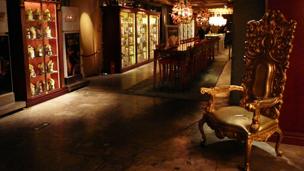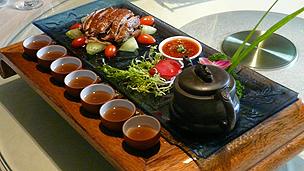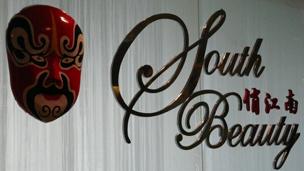Fighting off Sars to make a business of Sichuan cuisine
- Published
The economic reforms implemented by the Chinese government some 30 years ago led to an explosion of economic activity across the country.
Millions of people were confronted with the possibility of creating businesses of their own.
One of the new generation of entrepreneurs that took advantage of this opportunity is Zhang Lan, founder of the South Beauty chain of restaurants, which specialises in Sichuan cuisine.
The company now has branches across China, and says it is looking to expand overseas.
Zhang Lan's father was a university professor. He was branded a 'rightist', and during the Cultural Revolution the family was sent to live in the provinces. In the early 1970s the family returned to Beijing.
Zhang Lan got the chance to go and live in Canada, and found the experience a life-changing one.
She says she was impressed by "the advancement of the Western world" and was determined to make a success of herself. She took on several jobs in Chinese restaurants, and eventually saved up $20,000 (£12,550).
Planting the seed
On her return to Beijing, she decided to launch a restaurant of her own, using her savings as seed capital.
It was not easy at first. According to Zhang Lan, in the early 1990s there was still a feeling of living in a planned economy.

The entrepreneur realised an eye-catching interior was key to her restaurant's success
There wasn't much of a culture of eating out, and customers were hard to find. Neither were there many other entrepreneurs or role models to follow.
Zhang Lan had decided to concentrate on Sichuan cuisine, but she came to realise that in order to succeed, the restaurant would have to offer more than just food.
She came up with the idea of emphasising the design and look of the establishment. She hung pictures on the walls, and decorated the place with bamboo imported from the countryside.
This approach seemed to work, and customers flooded in.
Location helped too. The restaurant was situated near to some government ministries, and it proved popular with officials who often brought influential guests with them.
Setbacks
By 2003, Zhang Lan had begun to establish a chain of restaurants, and was employing thousands of people. But, just as she launched a new branch in Beijing, an outbreak of Severe Acute Respiratory Syndrome (Sars) struck the city.

She believes time is better spent dwelling upon all the chances of success, rather than possible failure
She recalls the time as a terrible period in the company's history: "No-one came to the new restaurant because of the worry of catching the disease."
She herself became infected, although she subsequently recovered. The business eventually managed to recover as well.
Today the South Beauty company has a network of some 40 restaurants in several Chinese cities, including the opulent Lan Club in Beijing, which has decor by the French designer Philippe Starck.
Branding and belief
One key factor that Zhang Lan believes lies behind the growth of the business is branding.
She says she studied the impact of Western brands on the Chinese market, and tried to emulate their approach, by creating a brand for her own business that would reach out to her preferred target audience: "business, white-collar people". She chose a logo based on a Peking opera mask.

Zhang Lan thought carefully about branding, its impact and how to reach out to her preferred market
But although Zhang Lan's ambition seems to know no bounds (she says that in 20 years' time she would like to make her business one of the "500 strongest companies in the world"), it remains to be seen whether a restaurant brand aimed at the Chinese market will also be able to flourish on a global scale.
Zhang Lan recalls Mao Zedong's saying that "women hold up half the sky" and believes Chinese women are particularly suited to becoming entrepreneurs because many of them are used to being persistent and are extremely motivated to overcome difficulties. But she adds that persistence is one quality that all entrepreneurs need.
Luck plays an important role too. A friend asked her, when she was starting out, what she would do if her business were to fail.
Zhang Lan replied that, instead of thinking about failure, time would better spent dwelling upon "the thousands of chances for success".